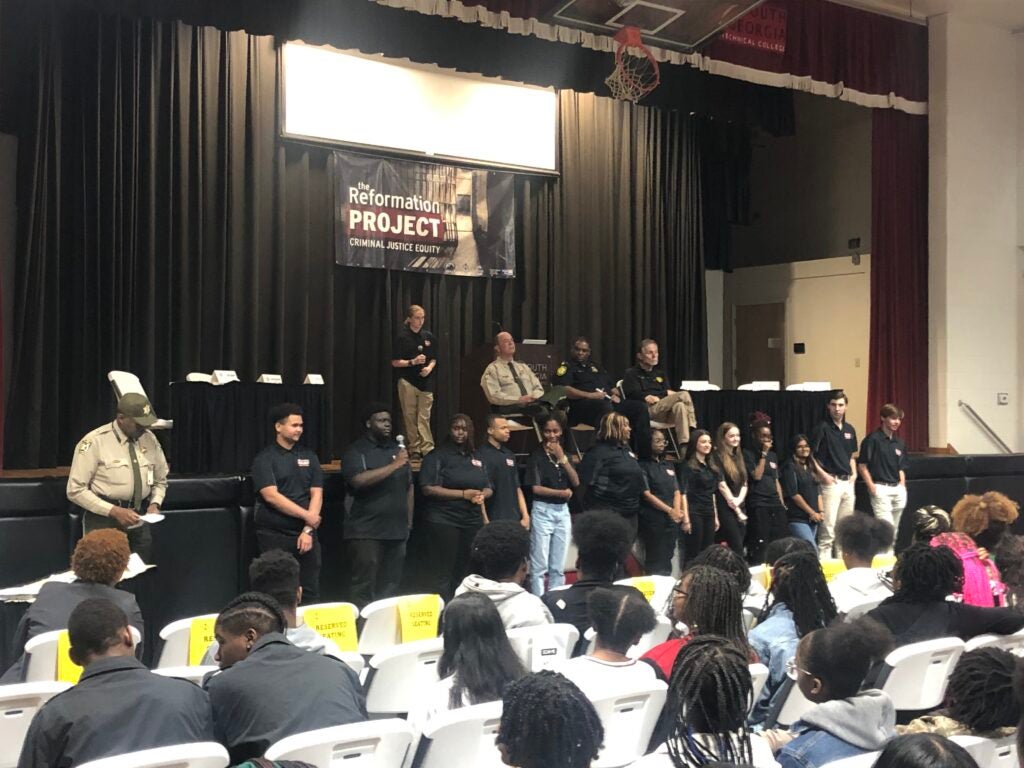Sumter County Violence Prevention Youth Summit
Published 12:54 pm Tuesday, April 2, 2024
|
Getting your Trinity Audio player ready...
|
The Sumter County Violence Prevention Youth Summit was held at the South Georgia Technical College Gym. Students from grades 10 th through 12 th from Furlow Charter School, Sumter County High School, and Southland Academy participated. The Sherriff introduced a video titled Reformation Project Documentary Film, which included local leaders and those who had been in the prison system discussing crime.
Afterward, students had the opportunity to ask questions about violence in the community by scanning QR codes and submitting their questions to law enforcement officers. One student asked about prevention programs. “What programs do we have in place, or we anticipate incorporating in our community to prevent violence?” Major Jackson of the Americus Police Department responded. “Programs like this can contribute to reducing the violence.” He mentioned programs run by Dwight Harris, founder of the Dwight Harris Boys Club and Summer Camp. Jackson also mentioned the GREAT program and the DARE program in the school system and how they sought to combat gang participation and drug use respectively.
He also mentioned churches. “Church plays a big role in the well-being of any community.” He mentioned the role of the individual. “Everything begins with you. Of course it starts with the parents initially, but at some point, it becomes you. You make a decision about what you want to do and what you want to be.”
Another student-submitted question asked about causes. “Why do you think so many young people my age turn to a life of crime and gang activity?” Colonel Hernandez of the Sumter County Sheriff’s Office answered: “I think one of the biggest contributors is peer pressure.”
Major McCorkle, Americus Police Department, also answered: “I think one of the biggest contributors that we deal with is a lot of children, a lot of teenagers, don’t understand the
consequences of their actions. People get caught up in the moment. I got disrespected. What’s one of the first things people are doing nowadays? They are grabbing a gun. But I am telling you, almost to a T, the vast majority of them, the minute they shoot, they all the sudden realize I have messed up.”
The teen panel convened with Harris moderating. He asked the first question. “What is violence?” Faith Gary answered. “Some people think that violence is physical, but violence can also be
emotional, it can be mental, it can be a lot of things. Violence is not just hitting people, punching people, violence can be how you talk to people, how you interact with people, and simply just how you live your life, you could be just a violent person.” Harris responded, asking about the use of harsh language. “Could that very easily turn to violence?” Gary responded: “Very easily.”
Harris presented another question to the panel. “What are youth exposed to that could be considered as violence?” Julia Walker responded. “Youth can be exposed to violence in the media and in the songs we listen to. You know, everybody wants to be like their favorite rapper, their favorite singer, their favorite influencer. We have to learn to be our own person, and you don’t have to follow in the influence of these people who are encouraging you to do these violent behaviors.”
After the summit, youth panelist Penelope Uzcategui talked about how she came to participate. “My school actually picked out students who they thought would be the best to create a summit like this.” She described preparing for the panel. “It was fun, it was different. Especially since it was the first of it’s kind in the State of Georgia. Again, since it was a first, we had to get over the kinks
and stuff like that but I think overall it was a really good experience.” She shared her biggest take-away. “We don’t really realize what’s going out in the community as much as we should. Being in this experience has made me learn that there are actually people always trying to make this community better, and it’s appreciated.”
Walker also shared her experiences. “It was really fun and I enjoyed being able to speak to the youth, the future leaders. I really hope that like the message we are sending was clear and connects with them and helps.” She talked about the importance of knowing about violence prevention. “Because, you know, we see violence a lot. It’s everywhere we look. It’s in the media, it’s in the songs we listen to, it’s in our neighborhoods. If we don’t know how to prevent it, we can’t stop it, and we can’t cut down on it. Instead of violence diminishing, it gets larger and it builds up and that’s not good for anyone.”
She summarized the experience. “It was really eye-opening, because a lot of the stuff that we were talking about I didn’t know at first before we started having these meetings, and then we had them, and it really opened my eyes to what was going on around me, and it really connected with me.”
Bennett Minor helped support the panel, and shared his experience. “I participated by giving ideas and carrying out the process.” He talked about the impact of the Youth Violence Summit. “I think a lot of people took this really well, and I think that a lot of people will carry this out in the community.”







